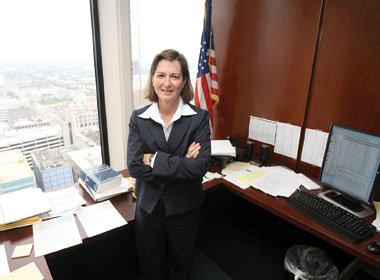
Targets of investigations, leaks to the press, civil rights, police practices, violent crime prevention, re-entry programs for ex-offenders…
By all accounts, Barbara McQuade the newly confirmed U.S. Attorney for the Eastern District of Michigan, nominated by President Barack Obama, is not only a seasoned federal prosecutor, but also a rising star. After serving as assistant U.S. Attorney on 211 West Fort Street, downtown Detroit, for 12 years, where she was deputy chief of the National Security Unit, McQuade, is now at the helm of federal law enforcement. A wife and mother of four, McQuade, who served as a law professor, practiced with a Detroit law firm and once worked as a reporter, brings real life perspective to the application of the law.
In this one-on-one interview McQuade opens up to Bankole Thompson, Michigan Chronicle senior editor, in a rare, exclusive interview since accepting her new presidential appointment about her objectives for the office and the launching for the first time of civil rights and violent crime units.
MICHIGAN CHRONICLE: What is the role of the U.S. Attorney?
BARBARA MCQUADE: I think the U.S. Attorney has the ability to do tremendous good in the district. As an assistant U.S. Attorney for the last 12 years I had a chance to actually prosecute the cases. But I saw a chance to do even more as the U.S. Attorney, not just handling individual cases but you really set priorities for the district and kind of direct the kinds of cases that we are going to work on. And I see so many needs in this district. So its been a chance to make sure we are using all of the resources we have to attack the problems that this community faces right now. Beyond just handling cases, the U.S. Attorney has an even larger role in seeking justice, prevention and community trust. It’s a tremendous opportunity to serve the people of the district, my home.
MC: When you say needs can you expound on what you mean?
BM: I have set some new district priorities, which were things that this community really needs right now. And those priorities are terrorism — the Abdulmutallab case, Militia case — violent crime, public corruption. I’ve put more prosecutors on public corruption to move those cases more quickly, financial fraud which victimizes many of our citizens in terms of mortgage fraud, health care fraud and environmental cases. And civil rights, another priority area that I think has been underserved in the past. We created a new civil rights unit to address some of those needs.
MC: With you at the top, what is going to change as far as cases and investigations moving quickly?
BM: I understand that perspective and I share the frustration that sometimes our cases take such a long time to come to fruition. I think the reason they can take so long is that we want to make sure that when people’s liberty is at stake that we are being careful and thorough. To prove someone guilty beyond a reasonable doubt is a very high standard and it should be. But we want to make sure that we have a very strong likelihood of winning before we bring a case. I also understand that there is a need for some urgency and a need for people to move on. Targets of an investigation deserve the opportunity to either be charged or not be charged. And the city needs the opportunity to not always be under a cloud of suspicion.
At some point people need closure. So one of the things I’ve done in the public corruption arena is re-staff that group. We’ve got a core group of people who have been working very hard on cases for a long time. We’ve beefed up that group to 11 lawyers and we’ve also tried to move off their plates some additional kinds of cases they had so they can focus all of their attention on public corruption. We try to give them all the resources they need both within the office and through investigative agencies.